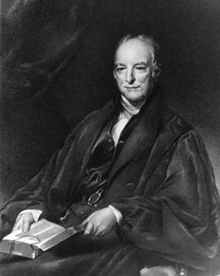William Hamilton Drummond
William Hamilton Drummond | |
|---|---|
 | |
| Born | August 1778 Larne, Ireland |
| Died | 16 October 1865 (aged 87) Dublin, Ireland |
| Occupation(s) | Poet, writer |
William Hamilton Drummond, D.D. (August 1778 – 16 October 1865) was an Irish poet, animal rights writer and controversialist.
Life
Drummond, eldest son of William Drummond, surgeon, R.N., by his wife Rose Hare, was born at
Straitened means interrupted Drummond's course, and left him without a degree, but he acquired considerable classical culture, and as a very young student began to publish poetry, in which the influence of the revolutionary ideas of the period culminating in 1798 is apparent. Leaving Glasgow in 1798 he became tutor in a family at
Some years after his settlement in Dublin Drummond came out as a
In old age Drummond suffered from attacks of apoplexy, under which his powers of recollection were gradually extinguished. He died at Lower Gardiner Street, Dublin, on 16 October 1865 and was buried at Harold's Cross cemetery, near Dublin, on 20 October.
Animal rights
Drummond has been described as a "staunch advocate of animal rights".
Works
The following is a list of Drummond's poems:
- Juvenile Poems: By a Student of the University of Glasgow [1795].
- Hibernia. A Poem. Part the First, Belfast, 1797 (apparently all that was published).
- The Man of Age, Belfast, 1797 ("of age" here means "aged"); 2nd edition, in which "some things are suppressed", Glasgow, 1798 (with an ode on the death of Robert Burns).
- The Battle of Trafalgar: A Heroic Poem, 1806, (contributed to the Belfast Literary Society, 3 March).
- The First Book of T. Lucretius Carus on the Nature of Things. Translated into English verse, Edinb., 1808 (Belfast Literary Society, 7 March).
- The Giant's Causeway, Belfast, 1811, (three books, with two maps and five plates; Belfast Literary Society, 2 March 1807).
- An Elegiac Ballad on the Funeral of the Princess Charlotte, Dublin, 1817, (anon.).
- Who are the Happy, Dublin, 1818, (appended are other poems and 33 hymns).
- Clontarf, Dublin, 1822 (anon.).
- Bruce's Invasion of Ireland, Dublin, 1826.
- The Pleasures of Benevolence, 1835.
- Ancient Irish Minstrelsy, Dublin, 1852 (eight of the pieces in this volume had already appeared in vol. ii. of James Hardiman's Irish Minstrelsy, 1831).
Among his controversial works were:
- The Doctrine of the Trinity, 1827; 2nd edition, 1827; 3rd edition, 1831, (reprinted also in America).
- Unitarian Christianity the Religion of the Gospel, 1828.
- Unitarianism no feeble and conceited Heresy, 1829, (addressed to William Magee, in reply to a publication by a layman, Philip Dixon Hardy, commended by Magee).
- Original Sin, 1832.
- An Explanation and Defence of the Principles of Protestant Dissent, 1842 (in reference to proceedings taken against unitarian trustees by Duncan Chisholm, alias George Matthews).
His works on animal rights:
- Humanity to Animals, 1830.
- An Essay on the Rights of Animals, 1838.
- The Rights of Animals: And Man's Obligation to Treat Them With Humanity, 1838.
His biographical publications were:
- Funeral Sermon for James Armstrong, D.D., Dublin, 1840.
- Autobiography of Archibald Hamilton Rowan, with additions, Dublin, 1840.
- The Life of Michael Servetus, 1848.
With papers in the Transactions of the Royal Irish Academy, Drummond wrote a prize essay The Poems of Ossian, Dublin, 1830, defending James Macpherson's authorship. Posthumous was Sermons, 1867, with memoir and two portraits.
Family
Drummond married, first, Barbara, daughter of David Tomb of Belfast, and had several children, of whom William Bruce Drummond and two daughters survived him; and secondly, Catherine (d. 22 April 1879), daughter of Robert Blackley of Dublin, by whom he left children Robert Blackley Drummond, minister of St. Mark's, Edinburgh; James Drummond, LL.D., principal of
References
- ^ Grayling, A. C; Pyle, Andrew; Goulder, Naomi; Brown, Stuart C. (2007). The Continuum Encyclopedia of British Philosophy. Thoemmes Continuum. p. 889
- ^ ISBN 9781486306992
- ISBN 978-0773462120
![]() This article incorporates text from a publication now in the public domain: Stephen, Leslie, ed. (1888). "Drummond, William Hamilton". Dictionary of National Biography. Vol. 16. London: Smith, Elder & Co.
This article incorporates text from a publication now in the public domain: Stephen, Leslie, ed. (1888). "Drummond, William Hamilton". Dictionary of National Biography. Vol. 16. London: Smith, Elder & Co.
Further reading
- Helen O'Connell. (2015). Animal Welfare in Post-Union Ireland. New Hibernia Review19 (1): 34–52.
